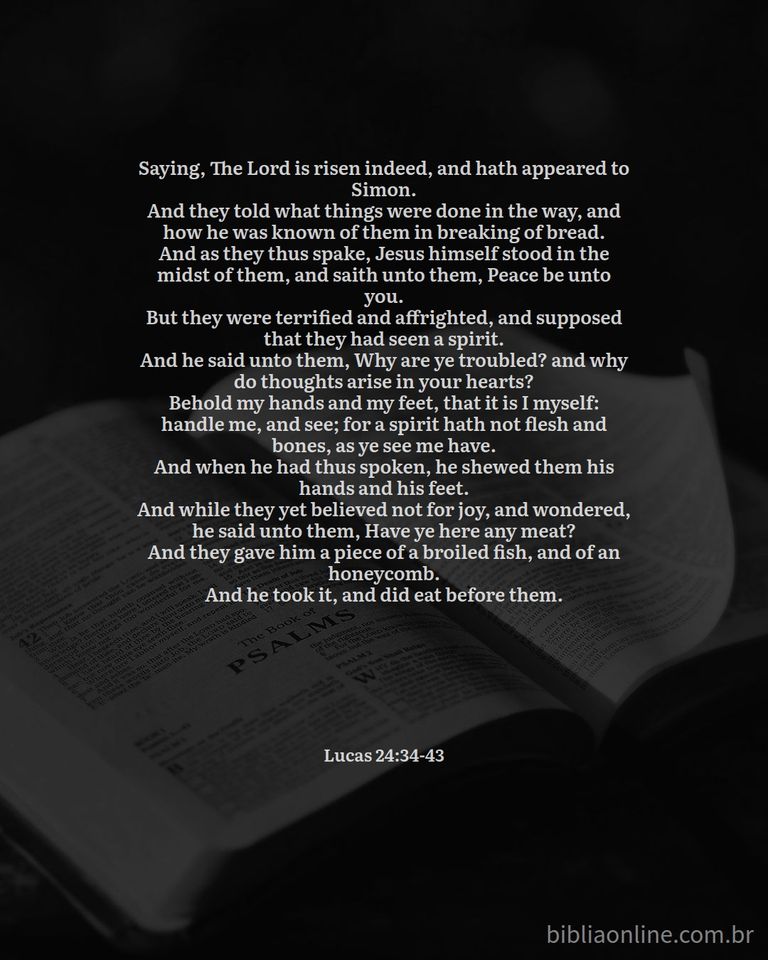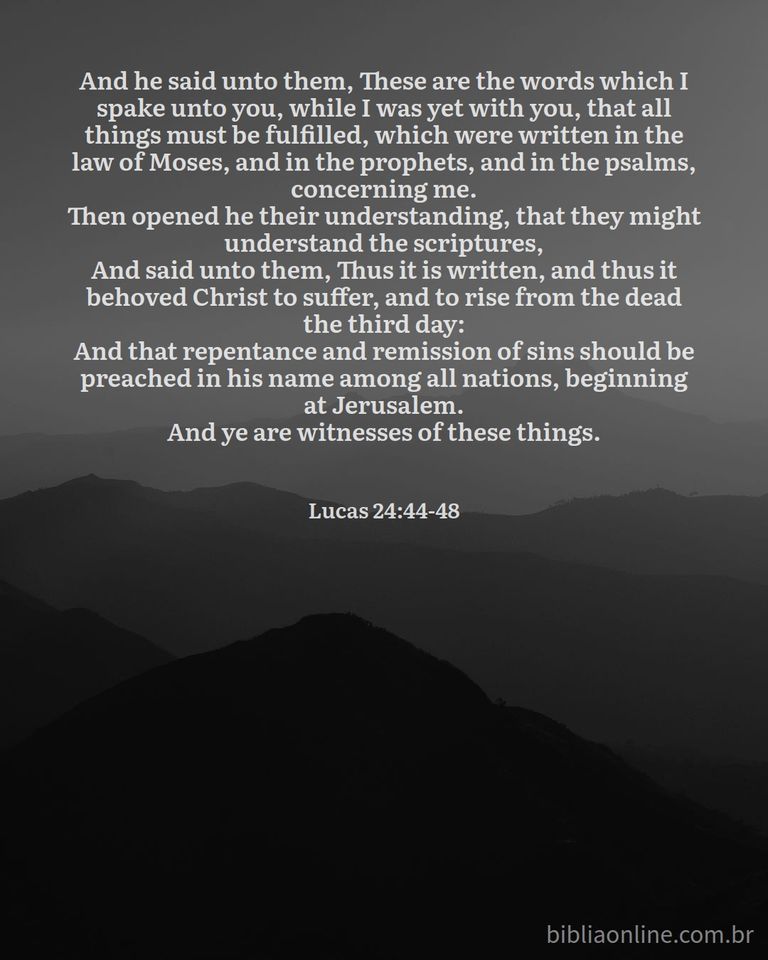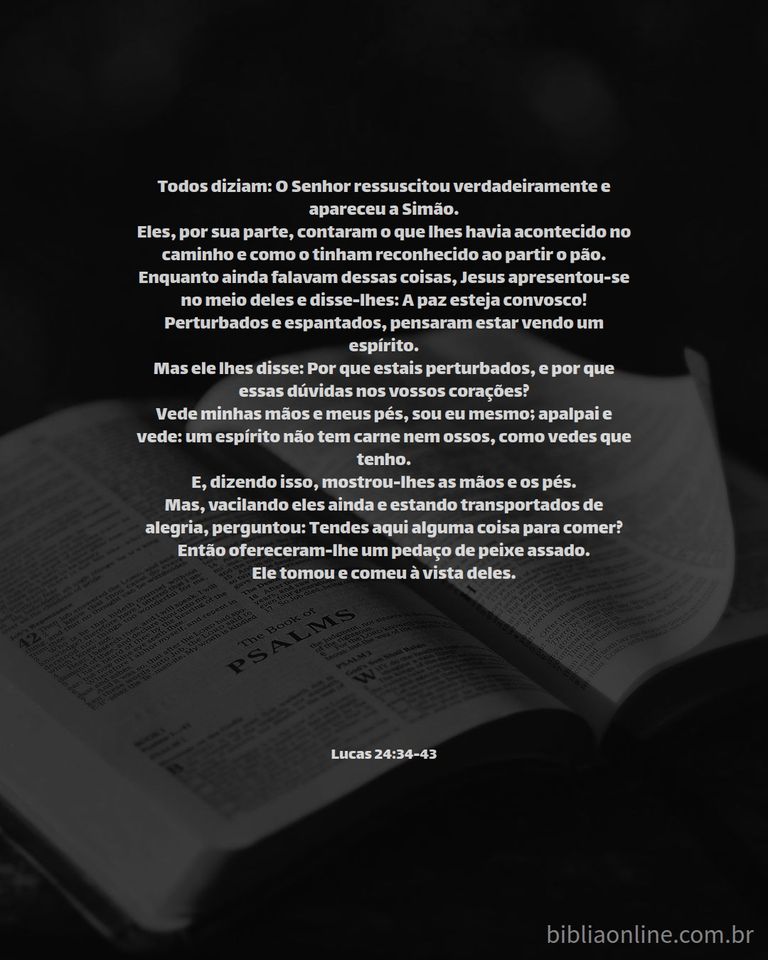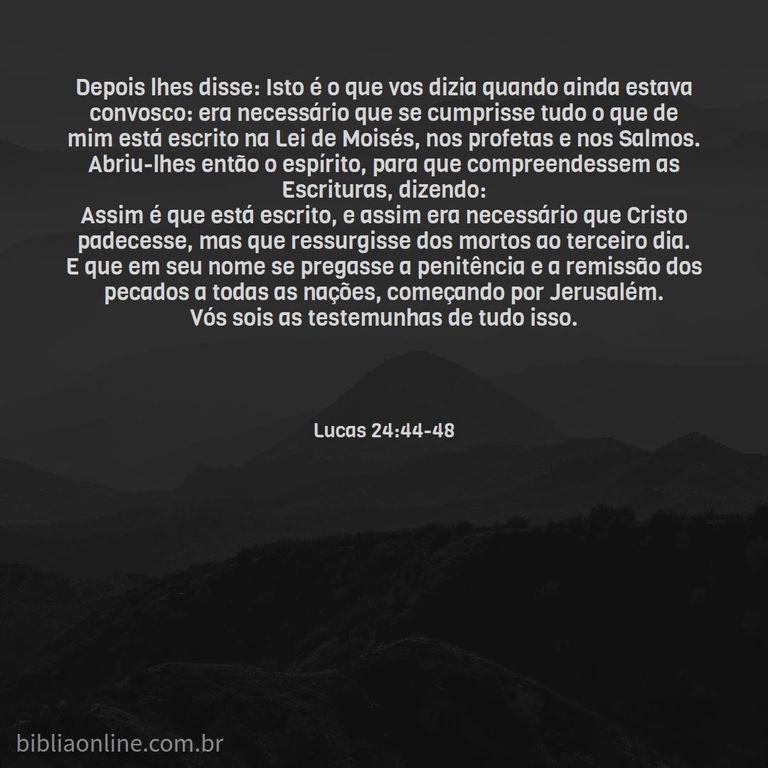
English version
In the gospel of the day (Luke 24:34-48), we see the reunion between Christ and the apostles after the crucifixion, because, as Christ said in Luke 24:25, the heart of man is foolish and slow to believe, and, therefore, Therefore, the works of faith were necessary.
His words when he met the apostles again were “peace be with you”. Some among the apostles believed that he could be a ghost, even showing the apostles' own lack of faith in their master's prophecies. But after all, who could blame them? It is human nature to doubt, so much so that one of the apostles, Thomas, also doubted, and that is why Christ himself praises those who do not need to see to believe, but are able to believe without seeing. Finding Jesus again showed that what Christ said was not a euphemism, but rather that it was literal.
Jesus showed them the holes in his feet and hands, to prove that he was who he said he was, and to reduce the disbelief of those he had chosen for himself, since they would have to lead the beginnings of Christianity, and could not have cultivated doubts. in their hearts, so seeing the wounds and touching the body of Christ showed them that it was not a merely spiritual phenomenon, but something physical and material, a real and palpable miracle right in front of them, a real proof that Christ spoke the truth about himself, indisputably. The very next passage, where Jesus asks to break his fast, also had the same intention, since a dead person or a ghost does not eat, while Christ was hungry and thirsty, similar to an ordinary human (but different), which helped to kill doubt in the hearts of the apostles, and restore their faith.

After this, Jesus says that what had been written by Moses, the prophets and in the Psalms should be fulfilled, and he educated the disciples on the subject, teaching them, so that they could be a witness to the resurrection and the time of grace, and to that they were capable of fulfilling their respective missions, given their limitations imposed by human nature.
The excerpt can also be complemented by reading the psalm of the day (Psalm 4:2, 4, 7, 9), where it is said “when I call, answer me, O my God, my justice! You, who knew how to relieve me in times of distress, attend to me out of pity and listen to my prayer.” The apostles cried out in their hearts for their Lord and Master, even after the events unfolded, and he came to their aid, because, as the texts themselves say he would come, to alleviate the moments of distress (although the psalms do not say so literally ), for the Lord does wonders for his servants.
Finally, Christ says that these would be witnesses of all that was, and they indeed were, teaching those who would become or those who would educate the fathers of the early church, such as Irenaeus of Lyons.

Versão em português
No evangelho do dia (Lucas 24:34-48), vemos o reencontro entre Cristo e os apóstolos após a crucificação, pois, como disse Cristo em Lucas 24:25, o coração do homem é tolo e tardio em crer, e, por isso, foram necessárias as obras da fé.
Suas palavras ao reencontrar os apóstolos foram “a paz esteja convosco”. Alguns entre os apóstolos acreditavam que poderia ser um fantasma, inclusive, mostrando a falta de fé nas profecias de seu mestre dos próprios apóstolos. Mas, afinal, quem os poderia culpar? É da natureza humana duvidar, tanto que um dos apóstolos, Tomé, duvidou também, e é por isso que o próprio Cristo elogia quem não precisa ver para crer, mas é capaz de crer sem ver. Reencontrarem Jesus mostrou que não se tratava de um eufemismo o que Cristo dizia, e sim que era literal.
Jesus mostrou-lhes os buracos nos pés e nas mãos, para provar que era quem dizia ser, e reduzir a própria descrença dos que este tinha escolhido para si, já que eles teriam que liderar os primórdios do cristianismo, e não poderia ter dúvidas cultivadas no coração deles, por isso ver as chagas e tocar o corpo de Cristo mostrou a eles que não se tratava de um fenômeno meramente espiritual, e sim algo físico e material, um milagre real e palpável bem na frente deles, uma prova real de que Cristo falava a verdade sobre si mesmo, de forma indiscutível. A própria passagem seguinte, onde Jesus pede para quebrar seu jejum, também tinha o mesmo intuito, já que um morto ou um fantasma não comem, enquanto Cristo tinha fome e sede, semelhante a um humano comum (mas diferente), o que ajudou a matar a dúvida no coração dos apóstolos, e restaurar a fé dos mesmos.

Após isto, Jesus diz que deveria se cumprir o que havia sido escrito por Moisés, pelos profetas e nos Salmos, e educou os discípulos a respeito do tema, ensinando-lhes, para que fossem testemunho da ressurreição e do tempo da graça, e para que fossem capazes de cumprir suas respectivas missões, dadas suas devidas limitações impostas pela natureza humana.
O trecho ainda pode ser complementado pela leitura do salmo do dia (Salmo 4:2, 4, 7, 9), onde é dito “quando eu chamo, respondei-me, ó meu Deus, minha justiça! Vós, que soubestes aliviar-me nos momentos de aflição, atendei-me por piedade e escutai minha oração”. Os apóstolos clamavam em seus corações por seu Senhor e Mestre, mesmo após o desenrolar dos fatos, e este veio em seu socorro, pois, como os próprios textos dizem que viria, para aliviar os momentos de aflição (embora os salmos não dizem tão literalmente), pois o Senhor faz maravilhas por seus servos.
Por fim, Cristo diz que estes seriam testemunhas de tudo o que houve, e eles realmente foram, ensinando a aqueles que viriam a se tornar ou a aqueles que viriam a educar os pais da igreja primitiva, como Irineu de Lyon.
** Your post has been upvoted (26.19 %) **
Curation Trail is Open!
Join Trail Here
Delegate more BP for bigger Upvote + Daily BLURT 😉
Delegate BP Here
Upvote
https://blurtblock.herokuapp.com/blurt/upvote
Thank you 🙂 @tomoyan